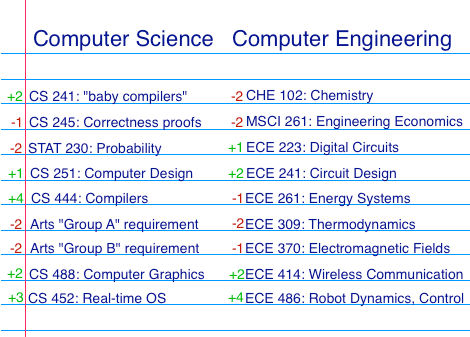Education
Choosing between Computer Science and Computer Engineering
The subtle differences between various Computer related majors are confusing, especially at the age when one makes their University choices. 6 Degrees of Computer Science is a good place to start, but the choice is not always clear. Some delegate the choice of their program to luck — apply to all, and see which one they are accepted at from the University of their choice. This does not necessary work if ones academic performance is well enough to earn multiple offers. Now what?
I think I have a tip for making this choice. Unfortunately I came to understand it only a few years after entering the University myself. Looking back, this would likely have helped me make a better choice to begin with (and saved me the trouble of figuring out the differences years later, and going through a complicate process of changing majors). The approach is simple, yet time consuming; though I guarantee that this will be faster than spending a year (or two!) switching majors.

Sample checklist for Computer Science vs. Computer Engineering courses
- Go to the website for your top University of choice. (That decision is a topic for another discussion.)
- Find a course calendar for two programs you want to compare.
- Ignore the courses that overlap in content, and write out all other notable courses. Depending on the level of detail you want to go into, you can pull in all of the course combinations, including minors and options, though a less detailed bird-view might be enough to steer one towards their preference.
- Assign positive points to courses of interest and negative points to required courses that you would rather avoid.
- Sum up the results.
Originally, I was thinking of comparing Computer Science to Software Engineering, but there was too much overlap to make a good example. Though this previous article could be of interest — The spirit of Software Engineering.
I think it should also be noted that some of the Computer Engineering courses are accessible to Computer Science students via the Digital Hardware Option, at least at the University of Waterloo, which was taken as basis for this comparison (on the grounds of me attending that University).
Here I’ve discovered that ECE courses put emphasis on energies inside the systems — power management, thermodynamics, magnetic fields. Also, I’m not a fan of required Chemistry course. Personally, I’m not that interested in such level of detail, especially when the area of application leaves computers and gets into power-plant scales of energy transfers. The better circuit design courses are available via an option, so the key question becomes: how fascinating are those 4th year courses?
Computer Science is interesting in a way that it has much more flexibility. This allows to both avoid dull subjects and to pick up courses in the areas of interest. On the flip side, there are certain elective requirements that need to be fulfilled, such as the courses from the so-called “arts groups”.
Personally, I’m really interested in getting to Compilers via the CS route; even if that doesn’t earn me an Iron Ring.






I think this is a good start but I’m not sure it’s this simple to decide between programs. First when looking up courses on the ‘net the descriptions will only tell you what the course is like in theory, in practice the instructor has a great impact on the quality. I think you also need to look at what where the degree leads.
For the first I suggest talking to people who have taken the actual classes and find out why they like or dislike the course. The why is at least as important as if the actually like it or not. If the reason they like the course is “no work, easy A” I suggest that’s not the best course. There are other factors that are not as clear-cut like the amount of theory/applied. This is more personal preference and only you know what you prefer. If you poke around forums you can often find people who have taken any given course in question.
The second answer is a little harder to find. There are some stats out there that show dollar values that different degrees tend to make but this is not the whole story. The best way is to talk to actual employers. Hard to do, I know, but if you keep the questions in your head you will find that you will bump into people whom have valuable insight and experience. Just make sure you ask for it.
Reply to comment
[...] aside, Computer Science vs. Computer Engineering is often a tough choice to make, but here are some ideas for figuring out the subtle differences between those [...]
1
Reply to comment
‘”
Reply to comment
)
Reply to comment
-1; waitfor delay ‘0:0:15′ –
Reply to comment
-5) OR 583=(SELECT 583 FROM PG_SLEEP(15))–
Reply to comment
eCfCQlqi’) OR 156=(SELECT 156 FROM PG_SLEEP(15))–
Reply to comment
yssHvnfU’)) OR 77=(SELECT 77 FROM PG_SLEEP(15))–
Reply to comment